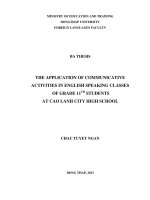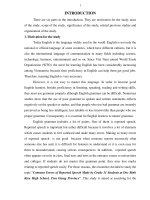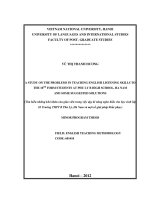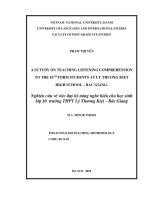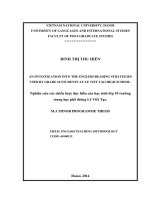Some methods to help grade 12a4 students at thach thanh iii high school learn english idioms well
Bạn đang xem bản rút gọn của tài liệu. Xem và tải ngay bản đầy đủ của tài liệu tại đây (849.52 KB, 20 trang )
SỞ GIÁO DỤC VÀ ĐÀO TẠO THANH HOÁ
TRƯỜNG THPT THẠCH THÀNH 3
SÁNG KIẾN KINH NGHIỆM
TÊN ĐỀ TÀI
SOME METHODS TO HELP GRADE 12A4 STUDENTS AT
THACH THANH III HIGH SCHOOL LEARN ENGLISH
IDIOMS WELL
Người thực hiện: Đỗ Thị Thu Nga
Chức vụ: Giáo viên
Đơn vị công tác: Trường THPT Thạch Thành 3
SKKN thuộc lĩnh vực (môn): Tiếng Anh
THANH HOÁ NĂM 2019
0
CONTENTS
page
I. REASONS FOR CHOOSING THE RESEARCH.......................................2
II. AIMS OF THE RESEARCH.........................................................................2
III. SCOPE, OBJECT AND RESEARCHING METHOD..............................2
IV. CONTENT:....................................................................................................2
1. Some methods for teaching idioms effectively........................................2
2. Practice activities and test........................................................................6
3.Some useful tips:.......................................................................................14
V. RESULT AFTER APPLYING THE RESEARCH IN TEACHING........15
VI. CONCLUSION...........................................................................................16
VII. REFERENCE MATERIALS...................................................................18
1
I. REASONS FOR CHOOSING THE RESEARCH
From the fact that seeing students do tasks relating to idioms randomly
and discouragingly, I decided to choose this subject as my research.Many of my
students confessed that they couldn’t guess the meaning of the idioms because
the words they knew their meaning didn’t help them at all.However, when I
explained and corrected them they expressed their surprise and interest. I my
self make such as “How must I do to help the students get correct answers for
hard-to-do questions?” and “how should practice activities and test be to get
their high attention to English idioms?”
It can’t be denied that to choose a correct answer about idioms is not easy at all.
Their real meaning themselves are fairly different from the meaning of
individual word in it . In addition there are no rules of generalisation of them
and different language and culture make it more sosphisticated. Therefore; they
make us confused.
Little understanding, little practice led into the fact that most of my students
couldn’t find out the answer correctly, which cause them frustrated with idiom
exercises. Teaching idioms might seem intimidating, especially if students have
never heard any of them before. Idioms are a common part of speech, though.
Getting students familiar with them early on can help them communicate more
naturally and give them a deeper understanding of the English language.
Thus, all the factors have forced us to ask ourselves once again:
+ Why can't many students do idioms exercises correctly ?
+ How do we teach them effectively?
+ What useful practice activities should we use for students to practice?
+ How do we test them ?
II. AIMS OF THE RESEARCH
- To help students learn and use English idioms correctly .
III. SCOPE, OBJECT AND RESEARCHING METHOD
- Scope : Researching in the process of teaching English at Thach Thanh 3
High school.
- Object: This subject is concerned with ways of practice activities in the
class.
- Researching method: Reading reference books , discussing with other
teachers of english, applying in teaching, observing and drawing out experiences
and searching on the Internet.
IV. CONTENT:
1. Some methods for teaching idioms effectively
a.Teaching idioms in contexts
2
The role of context is central in language learning. It’s common that my students
don’t really understand the various meanings of new words in different contexts.
That’s why they don’t know how to apply the words they have learned
practically in various contexts. It’s fundamental for teachers to provide a rich
context for students’ language learning and practice. “For instance, linguistic
contextual information enhances adolescents’ interpretation of idioms (Nippold
& Martin, 1989). The contextual cues surrounding a particular word can help
readers get that’s meaning. In contrast, context-reduced language will be hard
for readers to tolerate (Brown, 2001)”[1]. Consequently, it’s more effective for
students to learn language in meaningful contexts than learn isolated words
through memorization and drilling.
I am sure that my students can understand the idiom below by guessing through
the context :
Linda: I’m sure your parents were worried when you were sick and when you
are under the weather.
Marie: yes
“To be under the weather” here doesn’t mean that you are standing in bad
weather such as rain or black heavy clouds. Students can infer from the precede
information “ when you were sick” that “To be under the weather” is
comething like sickness. Thus, this idiom means normal tireness, not serious
illness.
Practice activity: Teacher writes some idioms on board for students interpret
and match them with corresponding phrases
For example:
1. Jane can do any math problem. It’s a piece of a. study / review
cake.
lessons
2. My friend and I see eye to eye in Rap music. b. it’s so easy
Both of us like Snoop Dog.
c. luxurious/ smart
3. The GCSE is coming and we need to hit the d. want to go to bed
books really hard.
e. have the same taste
4. Wow, that car looks like a million dollars.
5. After a long day of hard work Jimmy just wanted
to hit the sack.
The answer: 1b
2e
3a
4c
5d
b. Teaching idioms with illustrations
Some idioms appear again and again, but students can not remember clearly.
And I introduce pictures and images to solve the problem. It really works
because lively pictures and images are entertaining, which helps them remember
longer and more clearly. It is efficient to provide interesting pictures to foster
and reinforce vocabulary development. As a result, pictures or visuals must be
3
stimulating, interesting and motivating to students’ comprehension and retention
of idioms.
For example:
c. Teaching idioms with theme
We can include idioms in your normal lessons by introducing them
thematically. This is another good method to teach students idioms with desire
effect. When idioms are related to a topic, students will remember them easily
and will be familiar with the vocabulary they are using. When talking about
pets, for instance, you can introduce idioms such as “work like a dog” and
“dog tired” which are related to the topic and will give students something to
discuss. What makes idioms so interesting is that they are a unique
combination of words that have completely different meanings from the
individual words themselves.
For example: to express happiness, students often use normal words such as:
happy, glad, delighted… and it’s boring. It’s necessary to highlight and get more
fluency by using these suggested idioms:
1. Get a kick out of something = Enjoy doing smt every much
E.g: I get a kick out of podcasts
2 . Over the moon – to be extremely pleased or happy
E.g: I was over the moon when I passed my speaking test.
E.g: I have been over the moon ever since i got engaged
3. Like a dog with two tails
4
E.g: Was he pleased? He was like a dog with two tails.
4. Full of the joys of spring (When you are energetic, cheerful and happy):
E.g: James must have had some good news, he's full of the joys of spring today.
5. Happy as Larry
When you are as happy as Larry, you are, of course, very happy. But who is
Larry? No one is certain but it is believed that 'Larry' refers to an Australian
boxer called Larry Foley (1878 - 1917) who after receiving a large payment after
winning a fight was described in a newspaper as being 'happy'. Somehow this
description stuck and is now used all these years later.
E.g: My daughter was as happy as Larry with her birthday present.
6. On top of the world: To feel ecstatic, enjoy great health, success.
E.g: I've been feeling on top of the world since I started doing yoga every
morning.
7. On cloud nine: A person who is on cloud nine is overjoyed because
something wonderful has happened.
E.g: She's been on cloud nine since she found out she is pregnant.
8. In seventh heaven: To be so happy it feels like you are in heaven.
E.g: I was in seventh heaven when I landed my dream job.
9. Having a whale of a time: To have a very good time, have an exciting or fun
time
E.g: We had a whale of a time on holiday.
10. Burst with joy: To be so filled up with happiness as to be unable to contain
it.
E.g: My kids burst with joy when we told them we were going to the theme park
over the weekend.
d. Teaching idioms through reading, dialogue writing and role-play
I found from my experience that when there are sample dialogues which can be
viewed as short plays and used for students to act out rather than simply read
aloud, they can write their own dialogue containing idioms when they are asked
to do. Moreover, the dialogues the students write function as basic
communication at all levels (Scott & Ytreberg, 2000). Nunan (2003) stressed
that role-plays are also excellent activities for learners’ speaking in the relatively
safe environment of the classroom before they must do so in a real environment
[2]. Therefore, dialogues offer students opportunities to act out and practice oral
skill before encountering the real world.
Dialogues and role-play are useful written and oral activities, so I assigned my
students in pairs to write one dialogue by using the English idioms introduced in
class and then act out the dialogue out in the following class. Dialogue writing
could motivate students to write without burden because of pair collaboration
and role-play activity could help them remember the dialogue they wrote
through repetitive practices. It was easier and more fun for them to remember
English idioms because they shared and enjoyed learning English idioms with
5
friends. Thus, dialogue writing and role-play are useful and interesting activities
for students’ meaningful and efficient drills.
For example: Teacher asks students to work in pairs to write dialogues, each of
which contains one of 4 idioms they have learnt: long time no see, How long is
a piece of string?, to cut a long story short, a bunch of people
Here are some suggestions:
1. Binh: Hi Jill! I haven’t seen you for ages.
Jill: Yeah, long time no see! [I haven’t see you for a long time]
2. Nam: Hey, what happened to your plan to go on holiday with Hai?
Hoa: Oh, it’s a long story. I’ll tell you next time I see you. [It’s all complicated
and difficult to tell]
3. Bao: How long do we normally have to wait till they give us an answer?
Manh: (laughing) How long is a piece of string? It could be three days or three
month! [That’s an impossible question to answer. Used in answer to questions
beginning ‘How long …?’]
4. Karen: But how did it happen? I don’t understand.
Laura: Well, to cut a long story short, Peter fell in love with the restaurant
owner, married her and now he is the manager. [Tell the main points, but not all
the details]
2. Practice activities and test
2.1 Idiom practice worksheet
Write a sentence using the idiom and then explain the figurative meaning of the
idiom.
1. piece of cake
sentence:
_______________________________________
meaning:
_______________________________________
2. raining cats and dogs
sentence:
_______________________________________
meaning:
_______________________________________
3. cry over spilt milk
sentence:
_______________________________________
meaning:
_______________________________________
6
4. feel blue
sentence:
_______________________________________
meaning:
_______________________________________
5. all ears
sentence:
_______________________________________
meaning:
_______________________________________
.2.22gyhjkf
7
2.2 idioms crossword puzzle
1
2
3
4
6
5
7
8
9
13
10
11
12
14
15
16
17
Cross:
8
2.
3.
The US team did not win the World Cup, but they gave it their best _____.
You think Al should tell his boss that she’s wrong? Easier said than
_____!
4. The English teacher gave her students a useful ____ of thumb. She told
them not to repeat the same adjectives too many times in one essay.
6. You have an exam tomorrow morning? You’d better start hitting the ____!
7. Todd doesn’t like reading. It’s like ____ teeth to get him to read anything.
11. Julie was very upset when her landlord increased her rent by 25 percent.
Now she doesn’t know how she’ll make ends ____.
14. Eva loves to travel. She’s traveled all ____ the world.
15. Stop jumping up and down on the bed! If it breaks, it’ll be no laughing
________.
16. I wanted to buy The New York Times this morning, but by the time I got to
the store, they had already ____ out.
Down:
1. On a hot day like today, an iced tea is just what the ______ ordered!
2. We’ve only got two hours to finish this project. Let’s roll up our _____
and start working.
3. Pfi zer really wanted to Tanya to accept their job offer, so they agreed to
sweeten the ____.
5. If you studied your idioms, this crossword puzzle should be a ____ of cake.
8. Ted___ around the bush before telling his parents that he failed his test.
9. Mmmm, this chocolate cake is out of this _____!
10. Joe wants to join the army, but he hasn’t yet broken the ____ to his mom.
11. Oh, you’re fi nally home. That’s a load off my ____!
12. Frank, our best salesman, hasn’t made a sale all week. I’m afraid he’s lost
his _____!
13. Mark drove a hard ____ and got two T-shirts for the price of one.
17. Vivian is a night _____. She never goes to sleep before midnight.
9
The answer:
D
S
H
O
T
L
C
E
T
E
O
D
V
R
E
E
B
O
O
K
O
A
S
P
U
L
N
E
P
L
I
N
G
E
B
E
W
N
M
A
O
E
I
O
R
W
N
U
R
L
S
D
C
G
D
B
M
C
A
A
T
T
E
O
W
L
E
E
T
H
L
I
N
2.3 advanced idioms practice
For example: students read the letter then do tasks.
2.3.1. Explain the idioms in bold
Ex1
Dear Mary,
Sorry Lionel and I were such poor company last weekend, but we were both
feeling 1) down in the dumps, especially after finding out that Terry had
been 2) keeping us in the dark about the severity of the company’s money
10
problem. I was so angry with him. My own brother – can you believe it?
Believe me, running a family business 3) isn’t all it’s cracked up to be!
Anyway, the morning after uyou left, I was reading the paper when an
advert for a week in a country cottage 4) caught my eye. It sounded 5) right
up our street, so I mentioned it to Lionel and, after a lot of persuading, he
finally agreed that we both needed to 6) take things easy for a bit.
We’ve been here for five days now and I feel so much better. It’s right 7)
off the beaten track, so Lionel and I have had enough peace and quiet to
talk about the company’s problems and come up with some solutions. I’ll tell
you one thing – Terry is going to 8) come down to earth with a bump when
we get back!
Explaination:
1) down in the dumps: …………………………………………..
2) keeping us in the dark:………………………………………..
3) not be all it’s cracked up to be!:………………………………
4) caught my eye:…………………………………………………
5) right up our street:…………………………………………….
6) take things easy:……………………………………………….
7) off the beaten track:…………………………………………..
8) come down to earth with a bump:…………………………….
2.3.2.Match the items with the idioms
For example: Match the items with the idioms from Ex1 above
a. to relax
f. within one’s range of interests/
b. to keep sb unware of sth
knowledge
c. to be not as good as people say
g.depressed
d.to stop dreaming and start
h.very happy/ suited to a situation
thinking practically
i.to get sb’s attention
e.isolated and quiet
j. very early in the morning
The answer:
1g
2b
3c
4i
5h
6a
7e
8d
2.3.3 Choose the correct answer
Directions: Determine the meaning of the bolded expression. Choose the best
answer.
1. After going to the zoo, the mall, and the movies, Cassie was sick of bending
over backwards to entertain her nieces.
a. Cassie was doing very little to entertain her nieces.
b. Cassie was making small efforts to entertain her nieces.
c. Cassie was trying very hard to entertain her nieces.
d. Cassie was not trying at all to entertain her nieces.
11
2. Bobby would have been playing ball until the cows came
home if it hadn’t been for Suzie dragging him home for dinner.
a. Bobby was just about to stop playing ball.
b. Bobby didn’t even want to play ball to begin with.
c. Bobby prefers nature to athletics.
d. Bobby would have continued playing ball for a long time.
3. Mr. Johnson was very particular about the arrangement of his
classroom, so the thing he hated most was when his students
caused a ruckus with their wild horseplay.
a. Mr. Johnson hated when his students pretended to be
animals.
b. Mr. Johnson hated when his students played sports.
c. Mr. Johnson hated when his students wrestled around with
each other.
d. Mr. Johnson hated when his students made animal noises.
4. Eric wanted to fix his cousin’s computer, but he was already
having problems setting up his Aunt’s Wi-Fi network and he
didn’t want to open a whole new can of worms.
a. Eric was sick of spending his time helping his family.
b. Eric wanted to go fishing instead of working on computers.
c. Eric was having difficulties untangling the computer wires.
d. Eric was not ready to begin working on a complicated new
problem.
5. Even though Candace already had a new job, she submitted
her two week notice and conducted herself in a professional
way at her old job because she didn’t want to burn bridges.
a. Candace didn’t want to ruin her positive relationship with her
old employer.
b. Candace wasn’t ready to start her new job.
c. Candace was really going to miss her old job.
d. Candace was waiting until her last day to rub it in everyone’s
face that she was leaving.
6. World renowned country western super group The Mountain
Boys can sell out an arena at the drop of a hat.
12
a. The Mountain Boys may be able to sell out an arena, but it
will take a long time.
b. The Mountain Boys can sell out an arena very quickly.
c. The Mountain Boys are always willing to perform at charity
events.
d. The Mountain Boys enforce a dress code at all of their shows.
7. Vivian expected Craig to sob uncontrollably when she broke up with him;
however, Craig kept a stiff upper lip.
a. Craig cried even more than Vivian had expected.
b. Craig cried about as much as Vivian had expected.
c. Craig cried a little less than Vivian had expected.
d. Craig did not cry.
8. Mrs. Robinson expects Cassie and my presentation to be good, but we have
been working on it every night for the last week, so we are really going to
knock her socks off.
a. Cassie and the speaker are not prepared to give a good presentation.
b. Cassie and the speaker intend on hitting Mrs. Robinson rather than presenting.
c. Cassie and the speaker’s presentation will far exceed Mrs. Robinson’s
expectations.
d. Cassie and the speaker’s presentation will meet Mrs. Robison’s expectations.
The answer:
1C- when someone is of bending over backwards, they are trying very hard to
please another person.
2D-The expression “until the cows came home” means that something is
likely to continue for a long time.
3C- It is referred to as such in areas where activities might upset the
environment
4D- to open a whole new can of worms is to begin working on a complicated
problem.
5A- to burn bridges is to ruin a relationship
6. B- a drop of a hat means that something is likely to occur very quickly
7D- “keeping a stiff upper lip” means that a person does not cry despite facing
emotional turmoil
8C- “knock someone socks off” is to impress them greatly with your efforts.
2.4 Questions and Answers
1. What's the meaning of, "We're in hot water"?
A. We're in trouble
B. We're in the sauna
13
C. The water is too hot
D. The temperature is rising
2. What's the meaning of, "She gave him a dirty look"?
A. She feared him
B. She envied him
C. She looked at him angrily
D. She desired him
3. What's the meaning of, "It's in the bag"?
A. We got your back
B. We got it
C. It's actually in the bag
D. It will surely happen
4. What's the meaning of, "He gave me a leg up"?
A. He raised his leg towards my direction
B. He helped me when I was in need
C. He showed me his leg
D. He gave me the go ahead
5. What's the meaning of, "he thinks he's hot stuff"?
A. He is nice to look at
B. He likes drinking hot stuff
C. He's conceited
D. He likes eating hot stuff
6. What's the meaning of, "she's full of herself"?
A. She's conceited
B. She's horrible
C. She thinks she's all that
D. She lies a lot
7. What's the meaning of, "Let's face the music"?
A. Let's face this musical band
B. Let's listen to this piece of music
C. Let's admit we're in a difficult situation
D. Let's listen closely
8. What's the meaning of, "the story really got to me"?
A. The story got me emotional
B. I understand everything
C. The story affected me strongly
D. I liked the story
The answer: 1A 2C 3D 4B
5C 6A 7C 8C
3.Some useful tips:
After having done research, I got some tips to teach idioms wisely
Here are some helpful tips I got after the lessons:
14
1. Provide idioms in context, so students can fully understand the meaning. Be
sure to provide a sample conversation around it. For example, take the following
dialogue featuring the idiom “to be a chicken” when at a local amusement park.
Jack: Ooh, wow. Look at that roller coaster, Jane! It goes upside-down!
Jane: My stomach aches just looking at it. I will not ride that.
Jack: Ah, come on. Don’t be a chicken!
2. Teach idioms in spoken form, not written, and explain to students how they
are conversational, rather than formal. Have students practice the idioms in
dialogue to help them understand they’re used in spoken colloquial English.
3. Be sure to explain how the individual words have different meanings from the
whole idiom phrase. For example, how much does an arm and a leg actually
cost? Who knows?
4. Don’t just hand out a long list of idioms. Be sure to provide a small selection
of 5-10 idioms and explain each one. If you provide too many examples, it’ll
simply turn into an introduction of what an idiom is, rather than how to actually
remember the meaning and use one effectively in dialogue.
5. My students are ethnic minority students so I often teach them common
idioms that are fairly important and they are likely to need and try to use
pictures, images and games to reduce difficulty and tension .
6 .Check if students always remember the idioms they have learnt
7. Give them homework and correct it
8. Encourage them to list all the idioms they have learnt in their own notebook
and to make sentences with them. It is really useful.
9. Encourage students by good marks if they do well.
V. RESULT AFTER APPLYING THE RESEARCH IN TEACHING
Students became more attentive and conscientious in lessons.
I was really happy when I saw my students’ faces which change from anxiety
into face radiant with smiles when they find a correct answer.They asked me
questions during the lessons to catch on the knowledge instead of sitting and
listening quietly as they did before. When they practiced, they discussed
altogether in groups and good learners help the weak ones. These positive
changes shown that my trying was helpful and useful.
Students became more enthusiastic
It can’t be denied that I was often depressed and angry when looking at their
uncompleted homework exercises or their copied paper test. After applying the
research in teaching I was rather satisfied with my students’ homework. Thirty
three or thirty six among my fourty students often finished their homework
carefully. Of course, there were still some wrong answers, but that they did their
whole homework regularly could be regarded as great success.
Students understand idioms and they can explain the answer.
15
My students told me that they could understands the meaning of idioms after
lessons. Here is a correct answer of students when they worked in pair for a
practice activity within 15 minutes photograped in our lesson with the students
in 12 A4 who are not very good at English .I was proud and happy to see the
following encouraging answer of a schoolboy whose last result on average was
only 6,2 and another answer of a good student for fifteenth minute test:
Students enjoy this way of teaching
Interesting lessons and practice activities impressed students much. They were
also eager to take the worksheet home and to see my feedback after I had
checked their answer.
16
VI. CONCLUSION
In conclusion, my teaching is effective. The students made much progresss in
studying. In terms of their behaviors, they studied seriously.
I have learnt that a sucessful lesson includes many factors: teacher,
students, cultural differences…, so to make classroom teaching more
effective and useful for students, teachers have to try to make lessons
purposeful and interesting and students have careful prepararion before class
hours. Teachers should also try to make the classroom environment relaxing in
order that students are not under pressure while learning.
One more important thing is that when you test your students, notice to their
different abilities to give them suitable tasks.
In short, from my point of view the research I made was rather effective.I
am so thankful to receive more contributions to make it more improvable.
XÁC NHẬN CỦA
THỦ TRƯỞNG ĐƠN VỊ
Thanh Hóa, ngày 18
tháng 05 năm 2019
I assure that this is my own work.
Đỗ Duy Thành
Đỗ Thị Thu Nga
17
VII. REFERENCE MATERIALS
[1]
2. Oxford Advanced Learner’s Dictionary and English English
Vietnase Dictionary
3. />4. The internet.
18
Mẫu 1 (2)
DANH MỤC
SÁNG KIẾN KINH NGHIỆM ĐÃ ĐƯỢC HỘI ĐỒNG SÁNG KIẾN KINH
NGHIỆM NGÀNH GIÁO DỤC VÀ ĐÀO TẠO HUYỆN, TỈNH VÀ CÁC
CẤP CAO HƠN XẾP LOẠI TỪ C TRỞ LÊN
Họ và tên tác giả: Đỗ Thị Thu Nga
Chức vụ và đơn vị công tác: Giáo viên tiếng Anh trường THPT Thạch Thành 3
TT
1.
Tên đề tài SKKN
HOW TO TEACH THE
SOUND /u:/ AND / ʊ /
Cấp đánh giá
xếp loại
(Ngành GD cấp
huyện/tỉnh; Tỉnh...)
Tỉnh
Kết quả
đánh giá
xếp loại
(A, B, hoặc C)
C
Năm học
đánh giá
xếp loại
2016
2.
3.
4.
5.
...
* Liệt kê tên đề tài theo thứ tự năm học, kể từ khi tác giả được tuyển dụng vào
Ngành cho đến thời điểm hiện tại.
----------------------------------------------------
19


